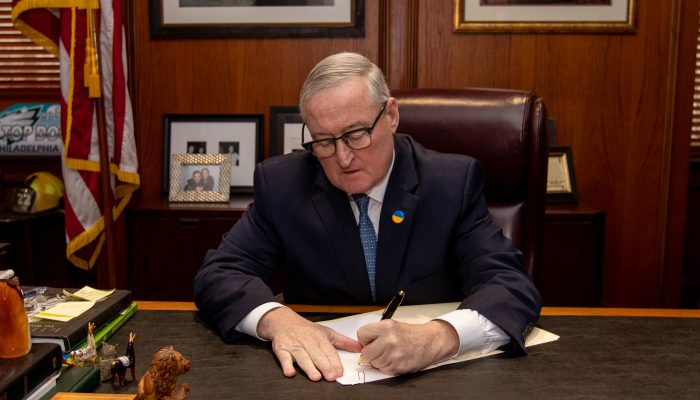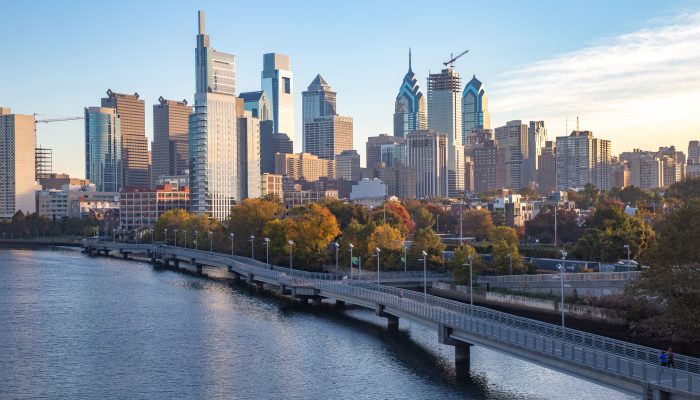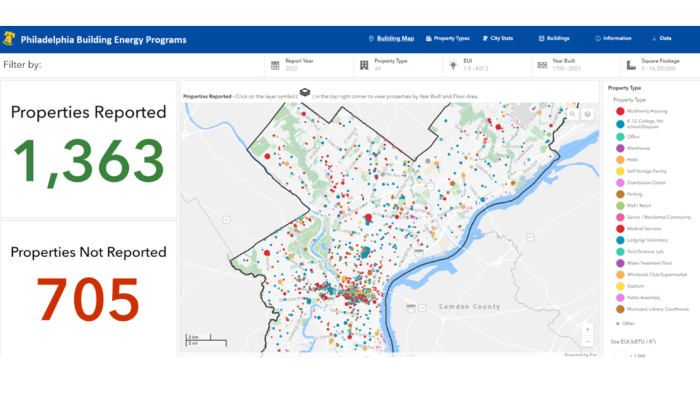Today, the City of Philadelphia released the Municipal Energy Master Plan 2022 Progress Update, which recaps how the City is working towards its institutional commitments to:
- Reduce energy use,
- Expand renewable energy,
- Lower carbon pollution, and
- Reduce energy costs in municipal operations.
The 2022 report highlights how the City has demonstrated a 44% reduction in greenhouse gas emissions from the 2006 baseline, due in part to a cleaner energy grid and ongoing improvements to our buildings. Despite new challenges dealt by the COVID-19 pandemic and a volatile energy market, we remain on track with our goal to cut emissions by 50% before 2030. Other notable updates include:
- In partnership with the Department of Streets and the Philadelphia Energy Authority, the Philly Streetlight Improvement Project (PSIP) has moved into the design phase after completing an audit of more than 130,000 streetlights in 2022. PSIP aims to improve nighttime visibility and lighting operations by converting 120,000 streetlights across the City into a network of energy efficient LED lights on a lighting management system. The cost neutral project has also completed trial installations and public surveys gathering input from stakeholders.
- The City has broken ground on the Adams Solar project, which will provide 22 percent of electricity needed to power all municipal buildings upon completion. The construction of this new 70WM solar array was created through a power purchase agreement with the Philadelphia Energy Authority and Energix Renewables.
- Since the citywide Building Energy Performance Program (BEPP) launched in 2020, the City has worked with tune-up specialists to make low-to-no cost tweaks that save energy, lower utility costs, and achieve BEPP compliance in eight large municipal buildings. Follow along with our progress towards compliance using the new BEPP dashboard.
- In 2022, the City joined the U.S. Department of Energy’s (DOE) Better Climate Challenge, committing to reducing portfolio-wide greenhouse gas emissions by at least 50% within the next ten years and to work with the DOE to share successful decarbonization strategies.
- The Energy Office is growing! The new Program Manager for Capital Improvements and Program Manager for Renewable Energy will help accelerate the progress of the MEMP and help the City to achieve its goals.
Mayor Signs Executive Order for Updated Municipal LEED Ordinance
After City Council passed an update to the 17-111 Energy Efficiency and Environmental Design in Construction of Buildings ordinance, the Mayor signed an executive order directing City agencies to ensure all new municipal buildings and major renovation projects achieve a LEED Gold certification beginning in July 2023 (Fiscal Year 2024). A LEED (Leadership in Energy and Environmental Design) certification recognizes high performance buildings worldwide. Since the City enacted its first municipal LEED ordinance in 2009, eight buildings have achieved a LEED certification.
“As the impacts of the climate crisis become clearer, raising the City’s LEED standard from Silver to Gold demonstrates our continued commitment to meeting our 2030 emissions goals,” said Mayor Jim Kenney. “While ensuring good stewardship of public funds, city government leads by example in addressing the climate crisis and enhancing health and wellness for the City’s workforce and visitors. Embracing efficiency and energy use reductions is an essential part of our strategy to become a climate-prepared city.”
Upcoming Guaranteed Energy Savings Act Project Request for Proposal
The Office of Sustainability, in partnership with Department of Public Property and Philadelphia Energy Authority (PEA), is planning a new project to perform deep energy retrofits at the City’s four, large downtown buildings, known as the Quadplex, and neighborhood Health Centers. In coming months, PEA and the City will be releasing a Request for Proposal to engage vendors in this exciting project to further municipal energy conservation and climate resilience efforts through a guaranteed energy savings model. Enabled by Pennsylvania’s Guaranteed Energy Savings Act (GESA), the City plans to contract with vendors called energy service companies, or ESCOs, to evaluate the targeted buildings and install energy conservation measures. The energy savings achieved from the improvements are guaranteed by the contracted ESCO(s) and designed to fully fund the project costs. The City has successfully completed two GESA projects, including a first at the Quadplex (in 2015) and another at the Philadelphia Museum of Art (in 2020), and is currently in the design stage of a third, the Philadelphia Streetlight Improvement Project.




